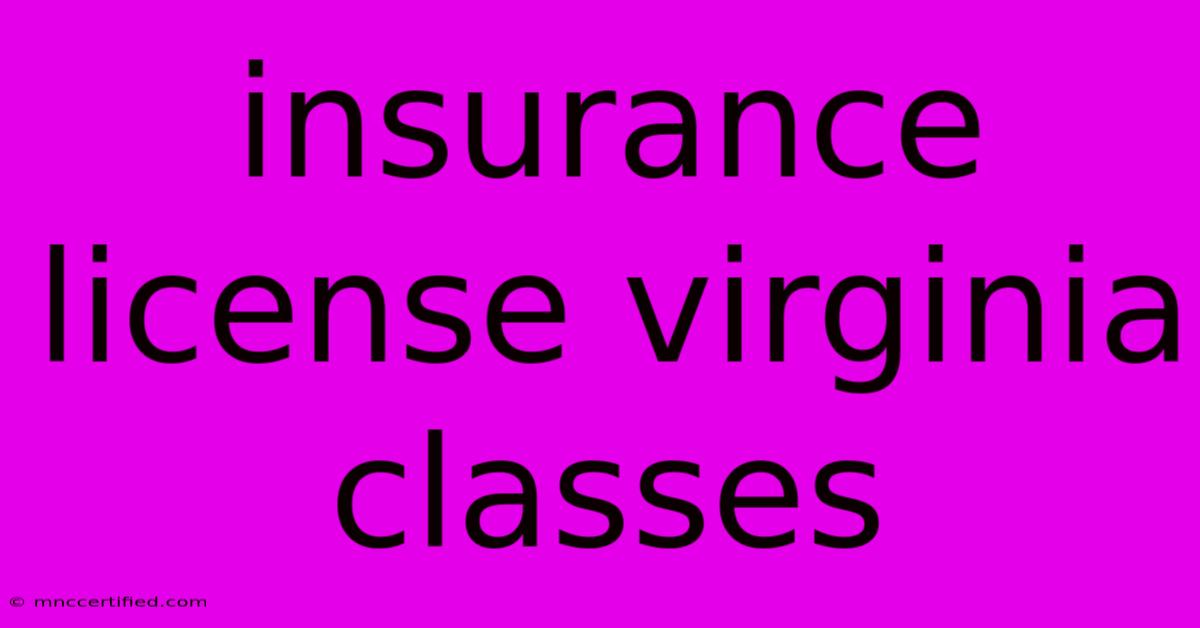Insurance License Virginia Classes

Table of Contents
Navigating Virginia's Insurance License Classes: A Comprehensive Guide
Are you looking to obtain an insurance license in Virginia? The process might seem daunting, but understanding the different license classes and the requirements for each can make it significantly easier. This comprehensive guide breaks down the various Virginia insurance license classes, outlining the necessary steps to obtain them and offering valuable tips for success.
Understanding Virginia's Insurance License Classes
Virginia offers a range of insurance license classes, each permitting you to sell specific types of insurance. Choosing the right class depends on your career aspirations and the insurance products you intend to offer. The key classes include:
Life and Health Insurance Licenses:
-
Life and Health (Combined): This popular option allows you to sell life insurance, health insurance, and related products like annuities. It’s a great starting point for those interested in a broad range of insurance offerings.
-
Life Only: Focuses solely on life insurance products, including term life, whole life, and universal life insurance.
-
Health Only: Concentrates on health insurance plans, such as individual and family health insurance, Medicare Supplement plans, and long-term care insurance. The complexities of the Affordable Care Act (ACA) compliance are a key part of this license.
Property and Casualty Insurance Licenses:
-
Property and Casualty (Combined): This license encompasses a wide array of insurance lines, including auto, homeowners, commercial property, and liability insurance. It's a significant commitment requiring comprehensive knowledge.
-
Personal Lines: Focuses specifically on insurance for individuals, such as auto, homeowners, and renters insurance. It's a great entry point for those interested in the personal lines market.
-
Commercial Lines: This license caters to commercial insurance needs, encompassing various business insurance policies. You'll need a strong grasp of commercial risk management.
Other Specialized Licenses:
Virginia also offers specialized licenses for particular insurance products or lines. These may include:
- Title Insurance: For those involved in real estate transactions.
- Surety Bonds: Concentrating on guaranteeing contractual obligations.
- Viatical Settlements: Dealing with the buying and selling of life insurance policies.
Remember to check the Virginia State Corporation Commission (SCC) website for the most up-to-date information on license classes and requirements. Regulations can change, so staying informed is crucial.
Steps to Obtain a Virginia Insurance License
Regardless of the chosen class, the general steps for obtaining a Virginia insurance license include:
-
Pre-Licensing Education: Complete the required pre-licensing coursework from an approved provider. The number of hours varies depending on the license class. Thoroughly review the course material to ace the exam.
-
Examination: After completing your education, you'll need to pass the state-required insurance licensing exam. Practice exams are highly recommended to improve your chances of success.
-
Application: Submit a complete application to the Virginia State Corporation Commission (SCC), including background checks and any other required documentation. Ensure your application is meticulously filled out to avoid delays.
-
Licensing Fees: Pay all associated licensing fees to the SCC.
-
Appointment: Once your application is approved, you’ll need to be appointed by an insurance company to legally sell their products. Research and choose a reputable company that aligns with your career goals.
Maintaining Your Virginia Insurance License
Continuing education is essential for maintaining your insurance license in Virginia. You'll need to complete specific continuing education (CE) requirements annually to keep your license active. Failure to comply with CE requirements will lead to license suspension or revocation.
Tips for Success
- Choose the right class: Carefully consider your career goals and the type of insurance you want to sell.
- Study diligently: Thoroughly review the pre-licensing course material and utilize practice exams.
- Understand the regulations: Familiarize yourself with the Virginia SCC regulations and requirements.
- Network: Connect with other insurance professionals to gain valuable insights and experience.
- Stay updated: Keep abreast of changes in insurance regulations and industry trends through continuing education.
Obtaining an insurance license in Virginia requires dedication and effort. By understanding the different license classes, following the necessary steps, and utilizing the tips provided, you can successfully navigate the process and begin a rewarding career in the insurance industry. Remember to always consult the Virginia State Corporation Commission for the most accurate and updated information.

Thank you for visiting our website wich cover about Insurance License Virginia Classes. We hope the information provided has been useful to you. Feel free to contact us if you have any questions or need further assistance. See you next time and dont miss to bookmark.
Featured Posts
-
Auto Insurance Saratoga Springs Ut
Nov 16, 2024
-
Ireland Rugby Ratings Argentina Match 2024
Nov 16, 2024
-
Romania Vs Kosovo Prediction And Lineups
Nov 16, 2024
-
Trump Gains Support Sylvester Stallone Weighs In
Nov 16, 2024
-
Mike Tyson Vs Jake Paul Fight Preview
Nov 16, 2024